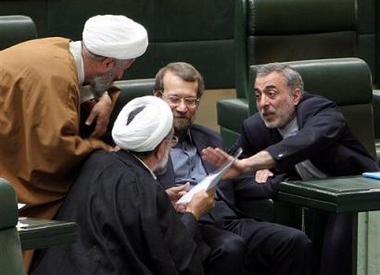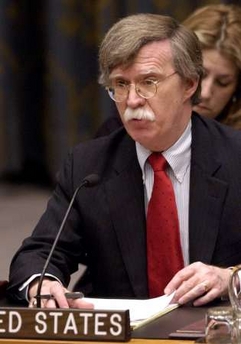|
Bolton: U.N. will send Iran strong signal
(AP)
Updated: 2006-03-17 13:44
U.S. Ambassador John Bolton said Thursday the U.N. Security Council appears
determined to send a "strong and clear signal" to Tehran about its suspect
nuclear program, after a meeting of the powerful U.N. body that he described as
the best so far.
 |
| Iran's top nuclear negotiator, Ali Larijani, second right, who is
also Iran's Secretary of Supreme National Security Council, listens to the
lawmakers, prior to an unofficial and closed session of parliament in
Tehran, Iran, Thursday, March 16, 2006. Iran's top nuclear negotiator said
Thursday that Tehran was ready to open talks with the United States over
the Iraqi issue, marking a major Iranian foreign policy shift.
[AP] |
In an informal gathering of the 15 council members, diplomats agreed to hold
the first formal Security Council consultations on Friday 锟斤拷 a sign that a split
between Britain, France and the United States on the one hand, and China and
Russia on the other, may have closed somewhat.
In addition, senior officials from six key countries involved in negotiations
over Iran's nuclear program will convene Monday to try to hammer out a final
deal and discuss what the council ought to do after it makes its first statement
on Iran.
"I would describe today's meetings as the best we've had so far," Bolton said
after the talks, the full council's second informal meeting on Iran. "The mood
of the discussion is certainly in the direction of a strong and clear signal to
Iran on the part of the Security Council."
Members of the council have grappled with the issue for a week, since the
board of the U.N. nuclear watchdog, the International Atomic Energy Agency, sent
a report on Iran to the Security Council. The board said it lacked confidence in
Tehran's nuclear intentions and accused Iran of violating the Nuclear
Nonproliferation Treaty.
Britain, France and the United States want the Security Council to call on
Iran to abandon uranium enrichment and comply with other demands by the IAEA to
clear up suspicions about its program. They suspect Iran is trying to build a
nuclear bomb.
Russia and China, which are allies of Iran, are not as skeptical of Tehran's
intentions, and have said in the past that tough council action could spark an
Iranian withdrawal from the Nuclear Nonproliferation Treaty and expulsion of
inspectors from the IAEA. They also fear a chain reaction of council action that
could lead to tougher measures later on, such as sanctions.
Uranium enrichment can be used either in electricity generation or to make
nuclear weapons. Iran insists its program is to produce nuclear energy 锟斤拷 not
weapons 锟斤拷 but the International Atomic Energy Agency has raised concerns that
Tehran might be seeking nuclear arms.
Bolton and the ambassadors from France and Britain refused to discuss what
progress had been made.
But diplomats said that Britain and France, who have taken the lead on
crafting a council response, planned to draw up a text and present it to the
rest of the council at Friday's closed-door discussion.
"We moved forward," France's U.N. Ambassador Jean-Marc de La Sabliere said.
China's U.N. Ambassador Wang Guangya was more equivocal in brief remarks to
the press.
"I think the differences are still there," he said. "There are some common
points but there are also some differences."
It's unlikely the council will come to a final decision before Monday, when
senior officials from the council's five veto-wielding nations 锟斤拷 the United
States, Russia, Britain, France and China 锟斤拷 and Germany will meet in New York.
That meeting would bring together the most senior foreign affairs officials
from those nations since a London gathering on Jan. 30.
Bolton told reporters that the top diplomats would talk about what to do
after the first council action. He described those talks as separate from the
issue of the text discussed Thursday.
The diplomats will try to come up with a "clear strategy" on what happens
next, Russia's Deputy U.N. Ambassador Konstantin Dolgov told The Associated
Press. "We need to have an agreed way ahead within the IAEA, in the Security
Council."

|